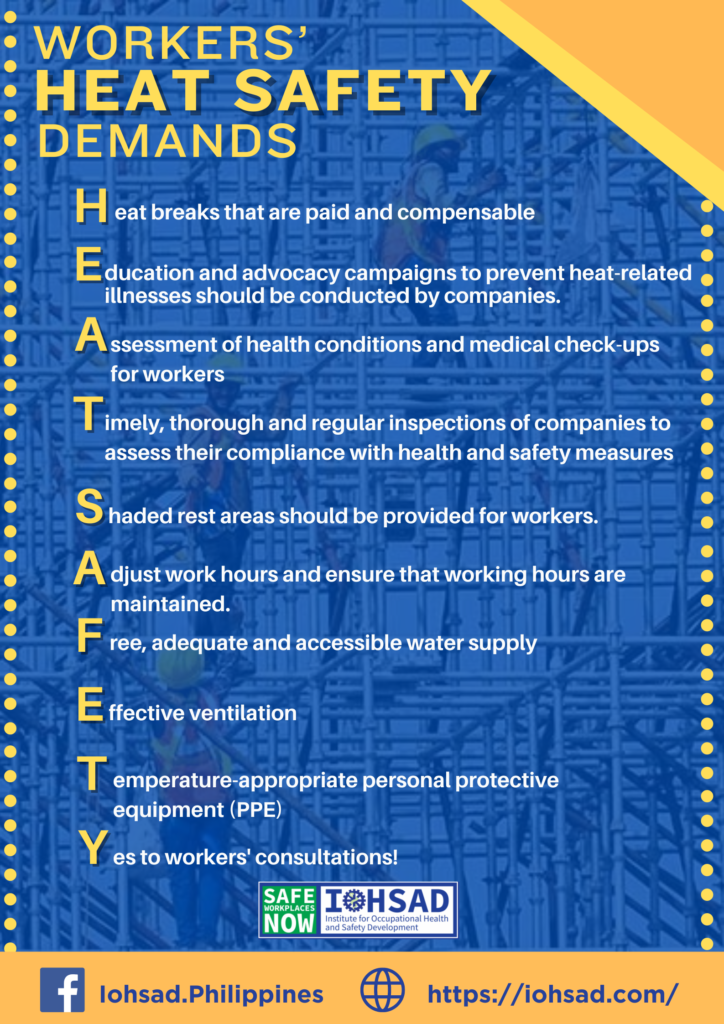Workers’ HEAT SAFETY Demands Urged by Workplace Safety NGO

Media Release
07 April 2024
Workers’ HEAT SAFETY Demands Urged by Workplace Safety NGO
Amidst record-high temperatures, the Institute for Occupational Health and Safety Development (IOHSAD), a workplace safety NGO, urges the Labor Department to take decisive action to safeguard workers’ health and safety.
Recent reports of workers enduring extreme heat conditions in various workplaces have prompted IOHSAD to urgently demand stronger measures from the government.
“Hot temperatures and low compliance with occupational safety and health standards make workers more vulnerable to heat-related illnesses such as heat strokes. We’ve received reports that workers have to bring their portable electric fans to survive the extreme heat in their workplaces,”said Nadia De Leon, IOHSAD Executive Director.
While acknowledging the Labor Department’s issuance of a labor advisory to prevent and control heat stress last year, De Leon emphasized that it’s insufficient to protect workers amidst the escalating temperatures.
“Contrary to the Employers’ Confederation of the Philippines’ (ECOP) position that heat breaks should not be mandated, we are urgently pushing for the Labor Department to issue a department order containing essential provisions that will ensure workers’ heat safety,” stated De Leon.
IOHSAD has outlined 10 HEAT SAFETY demands crafted in consultation with workers’ organizations and partners to address this urgent occupational safety and health issue.
1. Heat breaks that are paid and compensable
Workers should have adequate rest during the hottest periods of the day to prevent heat-related illnesses. Additional paid breaks can help reduce the risk of heat stress by allowing time to cool down and hydrate.
2. Education and advocacy campaigns to prevent heat-related illnesses should be conducted by companies.
Employees need to be educated about the signs of heat stress and preventive measures such as staying hydrated and taking regular breaks.
3. Assessment of health conditions and medical check-ups for workers
Regular health assessments enable early detection of heat-related health issues, ensuring workers receive necessary medical attention. Prioritizing workers’ health, particularly those with conditions like hypertension and diabetes, during high temperatures is crucial.
4. Timely and thorough inspections of companies to assess their compliance with health and safety measures.
Inspections should focus on identifying hazards, assessing safety measures, and implementing corrective actions to protect workers from heat-related illnesses and injuries.
5. Shaded rest areas should be provided for workers.
Employers should ensure that shaded rest areas are conveniently located and well-equipped to shield workers from direct sunlight and heat.
6. Adjust work hours and ensure that working hours are maintained.
Adjusting work hours to avoid the hottest parts of the day helps minimize exposure to high temperatures and reduces the risk of heat-related illnesses. Night differentials should be provided for extended work hours during cooler periods.
7. Free, adequate and accessible water supply
Companies should provide free, adequate and accessible water to all workers, encouraging frequent hydration breaks to minimize the risk of dehydration and heat exhaustion
8. Effective Ventilation
Proper ventilation is essential for reducing indoor temperatures and improving air quality in work environments. Installing exhaust fans, electric fans, or other ventilation systems helps circulate air and dissipate heat.
9. Temperature-appropriate personal protective equipment (PPE)
Providing workers with appropriate PPE helps mitigate heat exposure while ensuring adequate protection from workplace hazards.
10. Yes to workers’ consultations!
Worker participation ensures practical and relevant heat safety measures that respond to specific needs and challenges.
“Extreme heat brought about by climate change has become a major health and safety issue among workers in various sectors. It’s the government’s responsibility to ensure that workers are protected and risks are mitigated. We demand immediate and resolute action to address this urgent issue,” said De Leon.###
